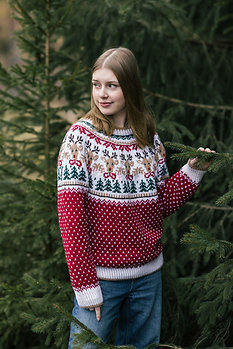Novita Icelandic Wool
50g ball
Novita Icelandic Wool is a pure wool made in Finland. The yarn is great for knitting Nordic patterns and Icelandic sweaters. Icelandic Wool combines the natural properties of Icelandic wool. The yarn is heat-insulating and water-repellent, durable, breathable and very soft.
Material:
100% virgin wool from Finland
barrel length:
90m/50g
needle size:4-5
Gauge:
18 stitches/24 rows = 10cm x 10cm
Consumption: for a sweater size. M you need about 600g
Novita
novitais the largest manufacturer of needlework yarns in the Nordic countries.
wool offFinland
Novita mainly uses wool from Finland, which comes from sheep farms all over Finland. The wool comes, among other things, fromFinnish sheep, a local original breed of sheep. These animals are part of Finnish history and heritage. A product made from Finnish wool stays beautiful for years, if not decades, and at the end of its life it returns to the natural cycle.
Since 2014, Novita has used over 36,000 kg of Finnish wool in its production. A total of over 900,000 balls of yarn containing Finnish wool have been produced. Finnish wool has been used in recent years, among other things, in the Novita yarns 7 Veljestä Lappi and 7 Veljestä Pohjola, 30% of the raw materials are Finnish wool. The yarn novelty Novita Suomivilla presented in autumn 2020 consists of 100% Finnish wool.
Novita produces most of its yarns in Finland, right next to the town of Kouvola in the Koria craft yarn factory. Production was transferred from Helsinki to Koria in 1974 and the spinning mill has been running there for almost 50 years. The factory in Koria has been CO2 neutral since 2020.
The yarns manufactured in Koria all have the trademarked seal of approval ”Avainlippu” (in German ”key flag”), as well as 90% of the yarns by Novita. The seal of quality is controlled and issued by the Union of Finnish Labor and at least 50 percent of the manufacturing cost of the product must have been incurred in Finland. The seal of quality can be found both on the yarn bands and in the Novita color cards.
The Koria factory has long been a focus on renewable energy and energy efficiency. The spinning mill has been using wind power energy since 2017EKOenergy-Label carries. EKOenergy is a European label for electricity that is 100% renewable. The EKOenergy label defines strict criteria for electricity production that protect the environment and part of the electricity price revenue is used to finance renewable energy projects.
Although we use a lot of energy and water in the various production steps in the manufacture of the yarn, the heat generated in the dyeing can be reused. The heat is stored and with it the water is heated for further coloring, so that we have less impact on the environment. Since autumn 2018, biogas has been used in the final production steps, which is obtained entirely from domestic renewable raw materials.
Lighting in large parts of the factory has been switched to energy-efficient LED lighting. The aim is to convert the entire factory to LED lighting. The waste in the spinning mill is effectively sorted and plastic is recycled.
In addition, Novita continues to try to minimize the packaging waste of its products so that the packaging materials can be better recycled and by using more sustainable packaging and packaging types. The spinning mill's production waste is 100% recycled and all packaging materials are made of recyclable material. According to Novita's sustainability vision, all products and packaging materials should be made from renewable or recyclable materials by 2030.
Sustainable wool
Sustainability is one of Novita's most important values, so almost all raw wool comes to our own mill from Finland or from Finland's neighboring regions, such as Norway or Great Britain. In addition, we receive merino wool from Spain. In this way, the CO2 footprint is kept appropriately small and long transport routes across the world's oceans are avoided.
Wool is the most important raw material for Novita, and sustainable wool production plays a crucial role. Novita takes the welfare of the animals very seriously and the legal regulations of the countries of origin ensure this.





































